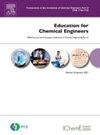Embracing the efficient learning of complex distillation by enhancing flipped classroom with tech-assisted gamification
IF 2.3
2区 教育学
Q1 EDUCATION, SCIENTIFIC DISCIPLINES
引用次数: 0
Abstract
Our students are digital natives and smartphones are part of their identity. However, the use of mobile devices in the classroom continues to be a non-integrated issue. For academic purposes, teaching actions involving smartphone apps expressly linked to student participation could be an opportunity to improve their performance. Under this premise, the use of the Quizizz app as a way of enhancing the flipped classroom methodology is herein proposed. The reported experience took place within a mass transfer separation course, at the Master level, during the academic courses 2021–22 and 2022–23. Enhanced distillation, a topic that is instrumental to future professionals in the field of Chemical Engineering, was addressed. It was found that the proposed approach allowed the students to better interpret the vapor-liquid and vapor-liquid-liquid phase equilibrium diagrams. Hence, the students demonstrated more skilled performance when they were asked to propose suited separation schemes (complex fractional distillation) using the Aspen Plus process simulator. Such success was not only in terms of deeper understanding but also on the observed predisposition towards autonomous learning.
利用技术辅助游戏化强化翻转课堂,高效学习复杂蒸馏法
我们的学生是数字原住民,智能手机是他们身份的一部分。然而,移动设备在课堂上的使用仍然是一个未整合的问题。就学术目的而言,涉及智能手机应用程序的教学行动与学生的参与明确挂钩,这可能是提高学生成绩的一个机会。在此前提下,本文提出了使用 Quizizz 应用程序来加强翻转课堂方法的建议。所报告的经验发生在 2021-22 和 2022-23 学年的硕士级传质分离课程中。该课程涉及对化学工程领域未来专业人员至关重要的 "强化蒸馏 "主题。研究发现,所提出的方法使学生能够更好地解释汽液和汽液液相平衡图。因此,当要求学生使用 Aspen Plus 工艺模拟器提出合适的分离方案(复杂的分馏)时,他们表现得更加熟练。这种成功不仅体现在加深理解方面,还体现在自主学习方面。
本文章由计算机程序翻译,如有差异,请以英文原文为准。
求助全文
约1分钟内获得全文
求助全文
来源期刊

Education for Chemical Engineers
Multiple-
CiteScore
8.80
自引率
17.90%
发文量
30
审稿时长
31 days
期刊介绍:
Education for Chemical Engineers was launched in 2006 with a remit to publisheducation research papers, resource reviews and teaching and learning notes. ECE is targeted at chemical engineering academics and educators, discussing the ongoingchanges and development in chemical engineering education. This international title publishes papers from around the world, creating a global network of chemical engineering academics. Papers demonstrating how educational research results can be applied to chemical engineering education are particularly welcome, as are the accounts of research work that brings new perspectives to established principles, highlighting unsolved problems or indicating direction for future research relevant to chemical engineering education. Core topic areas: -Assessment- Accreditation- Curriculum development and transformation- Design- Diversity- Distance education-- E-learning Entrepreneurship programs- Industry-academic linkages- Benchmarking- Lifelong learning- Multidisciplinary programs- Outreach from kindergarten to high school programs- Student recruitment and retention and transition programs- New technology- Problem-based learning- Social responsibility and professionalism- Teamwork- Web-based learning
 求助内容:
求助内容: 应助结果提醒方式:
应助结果提醒方式:


